Monstration
A monstration is a public performance similar to a demonstration but intended as creative performance art, often parodying a serious demonstration. The term was coined by Russian artist Ivan Dyrkin in 2004, and the phenomenon has been most popular in Russia.
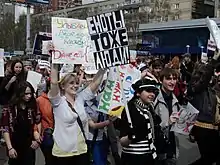
History
Soviet Union and Russia
In the 1920s and 1930s, similar processions took place in the Soviet Union. For example, there was a carnival demonstration in defense of beneficial birds. The participants of this procession carried banners like "The tit exterminates 6500 caterpillars a year". But basically these actions were of anti-religious content.[1]
Novosibirsk
In 1933, an anti-religious demonstration took place in Novosibirsk on Christmas Eve. Costumed Komsomol members marched around the city with effigies of priests and crosses and completed the action by burning a Christmas tree near the Lenin House.[1]
In the 1960s and 1980s, absurdist demonstrations were held by the youth of Novosibirsk Akademgorodok. In the 1960s, these actions were organized by the Integral Club.[1]
In November 1995, a march of artists and poets was held, also known as the Styobius Strip (Лента стёбиуса).[1]
In 2004, Artyom Loskutov and members of the Contemporary Art Terrorism group in Novosibirsk joined the annual May Day demonstration. They were carrying posters with deliberately absurd slogans in an attempt to shake up a boring political procession and to make fun. Fellow Siberian artist Ivan Dyrkin named the march "Monstration," a demonstration without the prefix de, which he considered a negative connotation as in deconstruction or degradation.[2]
Other cities
The modern monstration incorporates signs and messages that are deliberately absurd, nonsensical and apolitical that indirectly defy the government and express a conceptual paradox. Although monstrations are apolitical, participants have been arrested for political agitation. In 2010, Monstrations took place in 20 cities like Moscow, Saint Petersburg, and Vladivostok.[3]
The first monstration in Kursk took place on 1 May 2014. About 30 people went with the main slogan "For the rights of butterflies in the stomach".[4]
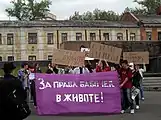 "For the rights of butterflies in the stomach"
"For the rights of butterflies in the stomach"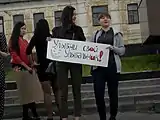 "Smile your smiler!"
"Smile your smiler!"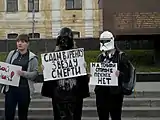 "Death Star for rent" and "Dark side has no cookies"
"Death Star for rent" and "Dark side has no cookies"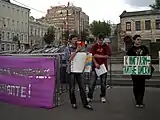
In 2015, the main slogan was "We did not watch Fifty Shades".
Poland
Orange Alternative (Polish: Pomarańczowa Alternatywa) was a Polish anti-communist underground movement, started in Wrocław, a city in south-west Poland, in the 1980s.[6] Its main purpose was to offer a wider group of citizens an alternative way of opposition against the authoritarian regime by means of peaceful street protests that used absurd and nonsensical elements.
Alytus, Lithuania
From 2009 to 2017 a series of Art strike Biennales were held at the Alytus art school. Organised by Redas Diržys and the psychic workers union.[7]
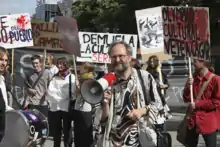 "Alytus Biennial 2009 Monstration - Artist United Will Never Be Divided"
"Alytus Biennial 2009 Monstration - Artist United Will Never Be Divided"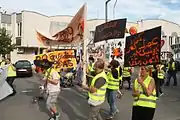 "Alytus Biennial 2011 Monstration"
"Alytus Biennial 2011 Monstration"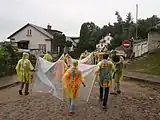 "Alytus Psychic Strike 2013 Monstration"
"Alytus Psychic Strike 2013 Monstration"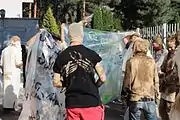 "Alytus Psychic Strike 2015 Monstration"
"Alytus Psychic Strike 2015 Monstration"
Recognition
In 2011 Monstration was recognized for "Innovation" by a government agency of modern art and selected as "Best in the Region."[8]
Government outrage
In 2014, Artyom Loskutov attempted to organize a routine monstration for August 17, when he ran into trouble. "We were talking about having a march, which is absolutely allowed under law," Loskutov says. "But in writing about it, we wrote about creating a Siberian Republic within the Russian Federation. There was no talk about separatism or anything, it's just that Moscow doesn't govern the regions very effectively."[9]
The purpose of the protest was to ridicule Kremlin's hypocrisy in the Annexation of Crimea by the Russian Federation and to raise awareness about politics in Siberia. "They decided to tell us how great it is when some republic moves for self-determination. Okay, well let's apply this to other regions. Can Siberia allow itself this same rhetoric? It turns out it can't."[10]
Russian telecommunications regulator Roskomnadzor launched a media blackout of the event, issued warnings to 14 media outlets that ran the story and threatened to close BBC Russian Service for reporting the announcement.[11] Roskomnadzor also launched an official investigation against BBC to confirm "an apparent violation of the law." In response, BBC added a description of the event as a “parody” that in no way promoted Siberia's independence from Moscow.[12]
Russian authorities compared the potential monstration protest to Euromaidan that led to the 2014 Ukrainian revolution. Nikolai Valuyev called it the "first attempt of global efforts to promote separatism in Russia."[13]
According to Dmitry Zhuravlyov, director of Institute for Regional Problems based in Moscow, "I can understand the position of these people [organizers of the march] on a psychological level," Zhuravlyov said. "They want to have more control over the riches of Siberia, and that is understandable. But what is unacceptable to Russia is that this whole idea goes against the Constitution. You cannot change the status of your region just like that." President Vladimir Putin recently signed legislation that introduced prison sentences for violations of territorial integrity in Russia.[14]
References
- "Кресты и «партия фортепиано»: с чего начиналась «Монстрация»". Сибкрай.ru. 22 April 2016. Retrieved 15 November 2022.
- Liesowska, Anna (1 May 2013). "The Siberian phenomenon of 'Monstrating'". The Siberian Times. Retrieved 1 May 2013.
- "Russian youths invent absurd way to by-pass demonstration ban". France 24. 17 May 2011.
- 46tv.ru, В Курске прошла "Монстрация" (фото)
- "Ленинград - Любит наш народ Lyrics".
- Bronislaw Misztal (March 1992). "Between the State and Solidarity". The British Journal of Sociology. 43 (1): 55–78. doi:10.2307/591201. JSTOR 591201.
- Michelkevičė, Lina (2017). "Starting from School: Contemporary Art Projects Involving Educational Institutions (2017)". Acta Academiae Artium Vilnensis. 84 (Education in, for and through Art / Edukacija mene, menui, per meną): 134.
- Liesowska, Anna (5 August 2014). "Русская служба BBC по требованию Роскомнадзора внесла правки в материал о "Марше за федерализацию Сибири"". News RU. Retrieved 5 August 2014.
- Maynes, Charles (5 August 2014). "As Snowden looks on, Russia cracks down on Internet freedom". PRI. Retrieved 5 August 2014.
- Luhn, Alec (5 August 2014). "Russia bans Siberia independence march". The Guardian. Retrieved 5 August 2014.
- "Authorities in Novosibirsk ban march to press for changing Siberia's status in Russia". The Siberian Times. 5 August 2014. Retrieved 5 August 2014.
- Rain, Andy (5 August 2014). "Russia to further examine provocative interview on BBC website". Itar-Tass. Retrieved 5 August 2014.
- "Russia: Siberian autonomy web page shut down". BBC News. 4 August 2014. Retrieved 4 August 2014.
- "Blocked BBC Interview Highlights Authorities' Insecurities". The Moscow Times. 5 August 2014. Retrieved 5 August 2014.